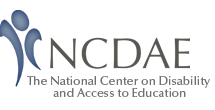NCDAE Webcast - Student Information Systems and Individuals with Disabilities
The archives below are from a Webcast held November 30th, 2005
Overview
Almost every college or university in the U.S. uses electronic information technology for class registration, financial aid services, and course grades and transcripts. As education-based web services become more complex, students and faculty with non-traditional computer interface abilities face greater barriers. The needs of students and faculty who use assistive technology such as screen readers or who don't use a mouse are seldom considered as web-based services are designed and implemented. The three panelists invited to participate in the November 30, 2005 NCDAE webcast addressed these issues from various perspectives including disability student services, web design and university information technology administration.
Archives
Panelists
Ron Stewart
Mr. Stewart is the founding president of ATHEN (Access Technologists Higher Education Network), an association and network for assistive technology professionals in Higher Education. He is also the Director of the Technology Access Program and the Northwest Center for Technology Access at Oregon State University (OSU). He has been involved in educational technology in one form or another for most of his career. Nearly a decade ago he assisted OSU to develop a plan and program to provide access to its technological systems for persons with disabilities. His experiences at OSU have served to inform the field in a positive way, and have been replicated in a variety of forms on other campuses.
Skip Knox
Skip Knox is the webmaster for Boise State University, a campus that serves 18,000 students. He has held this position since 1996 and is also a professor of history. As a professor, he has endeavored to ensure that his online course materials is fully accessible and standards-compliant. In his webmaster role, he works to ensure that university web services are accessible to all students.
Alice Anderson
Alice Anderson is the Technology Accessibility Program (TAP) Coordinator at the University of Wisconsin-Madison, Division of Information Technology (DoIT). She provides accessibility technology support for people with disabilities and for those designing applications, instruction and Web pages. DoIT is creating and supporting a coordinated University-wide infrastructure that encourages use of the tools and Web pages that are accessible for administration, teaching and learning. TAP works with individuals, colleges, departments and units such as the Campus ADA coordinator, McBurney Disability Resource Center, and Trace Research and Development Center. Alice also coordinates a variety of advisory committees addressing accessibility-The Web Accessibility Committee, Technology Accessibility Program, and Campus Kiosks. She has a broad range of skills and experiences in education from the UW Extension, Southwest Wisconsin Technical College and the University of California at Davis that includes information technology and instruction at a distance
The discussion was moderated by Marty Blair of the National Center on Disability and Access to Education

